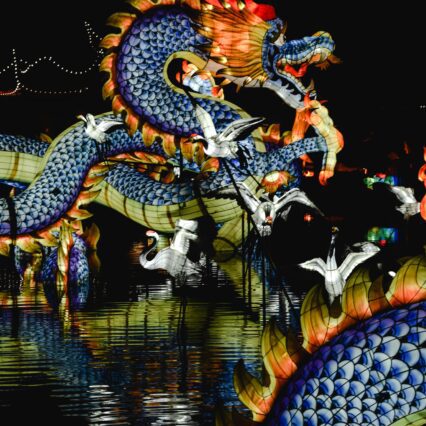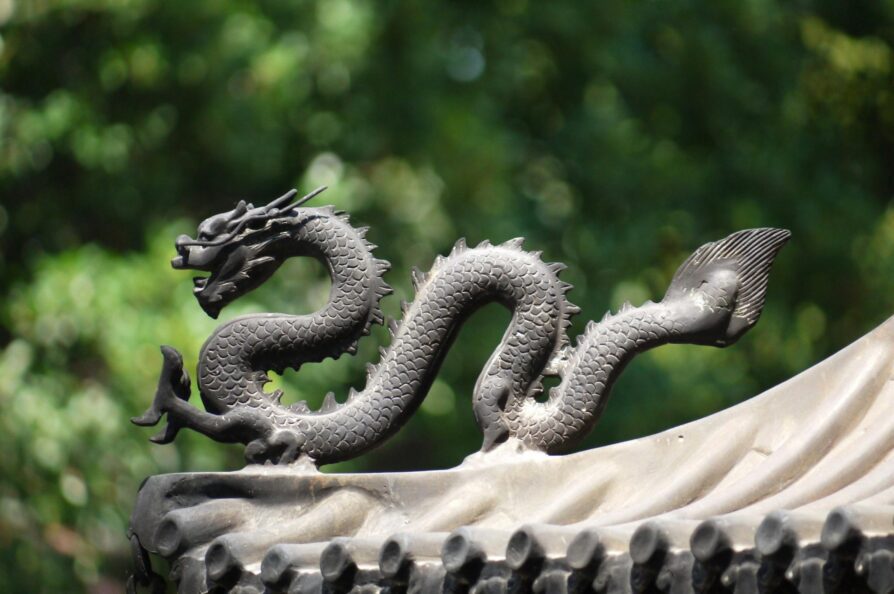Lunar New Year: Year of the Dragon

Lunar New Year: Year of the Dragon
There are twelve signs in the Chinese zodiac, although unlike the Western zodiac these signs have no relation to the stars — they consist only of animals. In order, these are: the rat, ox, tiger, rabbit, dragon, snake, horse, goat — although that can be translated as ram or sheep depending who you ask — monkey, rooster, dog, and pig.
With the beginning of the Chinese New Year in February, the rest of 2024 is the year of the fifth animal in this cycle: the dragon.
Regarding the Dragon 
All the zodiac signs are real-life, non-mythical animals — except the dragon. The dragon is considered the most powerful of all the zodiac signs.
It’s the only mythical creature of the Chinese zodiac and accordingly has special folk significance dating back to at least 3,000 BC. That’s at least 5,000 years of history, if not more.
There are many different stories about dragons throughout history that illustrate their revered status traditionally. One famous one is the Jade Emperor and the four dragons, wherein these dragons saved humanity from a drought caused by a forgetful god, only for the god to curse these dragons for interfering, leading to them becoming the four major rivers of China: the Yangtze, the Yellow, the Pearl, and the Amur.
In many ways, the Chinese conceptualization of the dragon is the opposite of the European dragons which were considered in Western folklore to be destructive and hostile. Unlike those fire breathers, Chinese dragons were believed to breathe clouds, and are still seen as wise and powerful creatures who are benevolent partners of our world. The dragon is seen as representing strength, health, and good fortune.
In traditional mythology, dragons didn’t occupy just one place but lived all over; the celestial dragon lived in the sky, while the coiling dragon lived in the sea. Certain dragons are associated with other specific geographical regions and general terrain as well.
Those Born in the Year of the Dragon
Of course, the year under which someone is born is traditionally said to hint at their personality, strengths, and weaknesses.
Being born in the year of the dragon is supposed to bring prosperity and good luck, and those born in that year are said to be natural leaders. Someone born this year believed to be especially charismatic, confident, intelligent, and visionary for the good of their own people. They’re thought to value their tribe and yearn for love and company.
These traits together make someone a powerful, strong authority figure. Accordingly, people born in the year of the dragon are thought to make integrity-bound politicians, natural entrepreneurs, and leaders of people across the spectrum who strive to use their vision and charisma to do what’s right for their people and community.
On the flip side, dragons can be overly-confident and get sucked into believing the hype of their own charisma. This can make them egotistical, overbearing, manic, and easy to trick when opponents know how to manipulate their own self-belief.
Along with the traits traditionally associated with those born in the year of the dragon in Chinese mythology, other factors can enhance or diminish their luck. These include numbers and colors — for example, one, six, and seven are lucky; three and eight go against the dragons’ natural qualities and so are unlucky. As for colors, gold, gray, and white are lucky for dragons; blue and green are unlucky.
It’s easy to see why the dragon is such a revered zodiac sign. They’re considered the leaders of our communities, revolutionary idealists, and forward-thinking visionaries who connect with the people around them. The mythology of dragons has almost-unfathomably deep roots — going so far back they’re older than most of what we think of even when we think of Ancient China; the mythology of the dragon in China is older than the first Ancient Egyptian pyramids.
To all the dragons out there, we hope you have a happy and prosperous year!




